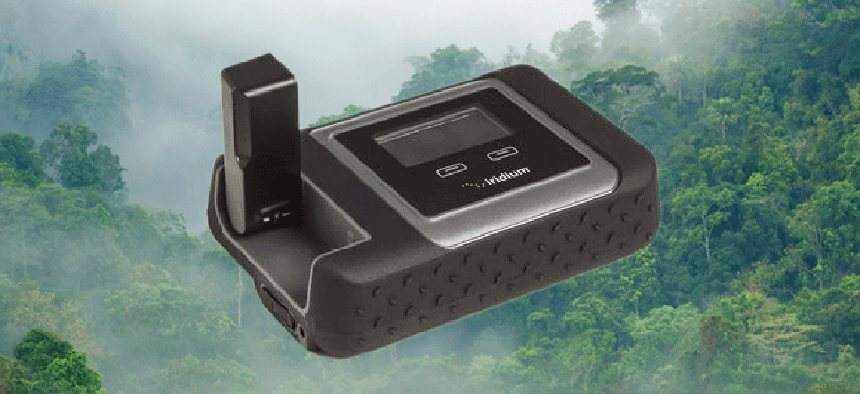Iridium GO! creates Wi-Fi hot spot for smartphones almost anywhere


Connecting state and local government leaders
Iridium GO! is a pocket-sized receiver/transmitter that can also serve as a hot spot, allowing up to five users within a 100-foot radius to make phone calls, send text messages and connect to the Internet.
Mobile devices are becoming ubiquitous in government, but their use can sometimes be problematic. In the military, for example, there are places that just don’t get cell service, most battlefields, for instance.
The Army, for one, wants its front-line soldiers to use smartphones to expand the kind of information they get and to improve situational awareness. It gets around the connectivity problem to some extent by hooking the smartphones up to the Rifleman Radios the troops carry. The Marine Corps is trying to develop a similar system.
Iridium Communications, which provides satellite links to the military around the world through a contract with the Defense Information Systems Agency, is trying to plug the gaps with Iridium GO!, a pocket-sized receiver/transmitter that connects users to its constellation of 66 low-Earth orbit satellites. It can also serve as a hot spot, allowing up to five users within a 100-foot radius to make phone calls, send text messages and connect to the Internet.
Soldiers can attach an Iridium GO! to their rucksack or to vehicles such as a Humvee.
“It has an external antenna port so soldiers can attach it to an Iridium, puck-sized, antenna that is magnetically mounted,” said Joel Thompson, vice president of product management at Iridium. “That way they can light up the interior of a vehicle as well as a surrounding area of up to 100 feet, and we’ve had it successfully operate at up to 200 feet.”
The battlefield solutions in place now use only some of the smartphone’s capabilities. The Rifleman Radio is data-capable, for example, so soldiers can use their attached smartphones to receive and send data and text messages, but they can’t use them to make phone calls. With Iridium GO! they can do that also.
However, the 10.4 oz GO! device is not meant to replace the Rifleman Radio, said Scott Scheimreif, Iridium's executive vice president, government programs. Instead, it could be used to augment what the members of a platoon already carry, or for situations where they don’t have the radios.
Iridium GO! was designed from the beginning to be the basis for creating a platform rather than a standalone product, Thompson said. The company wanted to give users the ability to build and design specific applications they could use in the field and on the ground. As an example, an app that iridium developed and is providing with Iridium GO! is a photo share app.
“You can take a picture with the phone and transmit it over Iridium GO!” he said. “A 5 x 7 photo with quite reasonable quality would take between 90 seconds and 2 minutes to transmit over the satellite link. For soldiers who are having to identify an individual, this gives them the opportunity to transmit the image and receive confirmation in a situation where they are out of radio range.”
Iridium GO! can also provide cover for anyone doing covert operations, Thompson said. A user could set the device up somewhere in the vicinity and look as though he is simply making a call on a smartphone. In that case he would be less likely to arouse suspicion than if he were to use a traditional, more bulky satellite phone.
Each of the devices costs around $800 and has been tested to IP (Ingress Protection) 65 ruggedized standards, but not yet to any mil standard. Its use is already included in the airtime contract Iridium renewed with DISA in October last year.
Iridium also introduced two other satellite service products separately from Iridium GO!, but that also have potential uses in government.
Iridium Burst is a one-to-many global data broadcast service that the company says offers low-latency broadcast data that traditional paging and broadcast services don’t provide. It works like a push-to-talk service, in which groups are defined along with the devices or individuals specific to that group. The sender can then send messages only a particular group’s devices and individuals.
One of the initial philosophies for the development of Burst was that it would support the Global Maritime Distress and Safety System (GMDSS), Thompson said. Inmarsat is the only approved provider of that service now, but Iridium has an application before the International Maritime Organization for it to also provide the service, he said, and is working closely with the U.S. Coast Guard to support that application.
Iridium Pilot Land Station provides what the company says is “pole-to-pole coverage and broadband data speeds” to individuals and organizations that are in remote locations and can’t otherwise get reliable Internet and voice connections. Thompson described it as a flexible platform that can be provisioned at either 36, 64 or 124 kilobit/sec rates — and therefore also at differently tiered prices — depending on what speed users want. It also provides for up to three separate voice lines.




